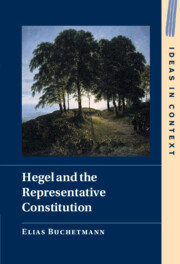Book contents
- Hegel and the Representative Constitution
- Hegel and the Representative Constitution
- Copyright page
- Dedication
- Contents
- Acknowledgements
- Conventions and Abbreviations
- Introduction
- Chapter 1 The Constitutional Question in Post-Napoleonic Germany
- Chapter 2 On the Nature of Constitutions
- Chapter 3 The Distribution of Power
- Chapter 4 Debating the Two-Chamber System
- Chapter 5 The Representation of Interests
- Conclusion
- Bibliography
- Index
Introduction
Humanising Hegel
Published online by Cambridge University Press: 13 April 2023
- Hegel and the Representative Constitution
- Hegel and the Representative Constitution
- Copyright page
- Dedication
- Contents
- Acknowledgements
- Conventions and Abbreviations
- Introduction
- Chapter 1 The Constitutional Question in Post-Napoleonic Germany
- Chapter 2 On the Nature of Constitutions
- Chapter 3 The Distribution of Power
- Chapter 4 Debating the Two-Chamber System
- Chapter 5 The Representation of Interests
- Conclusion
- Bibliography
- Index
Summary
Just over two hundred years ago, in the autumn of 1820, Georg Wilhelm Friedrich Hegel published what subsequently became one of the most contentious books in the history of political thought. This recent anniversary of the Philosophy of Right, together with Hegel’s 250th birthday, is an especially opportune moment to reflect anew on the book and its author. With his name invoked ubiquitously and incessantly, Hegel is more often treated as our own contemporary, or indeed as a kind of philosophical spirit hovering above the tides of time, than an actual human being who lived around the turn of the nineteenth century. My suggestion, in brief, is that we might do well to humanise this towering figure in the history of philosophy in greater measure than tends to happen, and to remember that both form and content of the notorious Philosophy of Right were subject to an indispensable measure of contingency. This study aims to demonstrate how a situated analysis of Hegel’s political thought, drawing on a wide variety of contemporary sources, enables a better understanding of his arguments and what he was trying to do in relation to the issues of his age.
- Type
- Chapter
- Information
- Hegel and the Representative Constitution , pp. 1 - 22Publisher: Cambridge University PressPrint publication year: 2023



